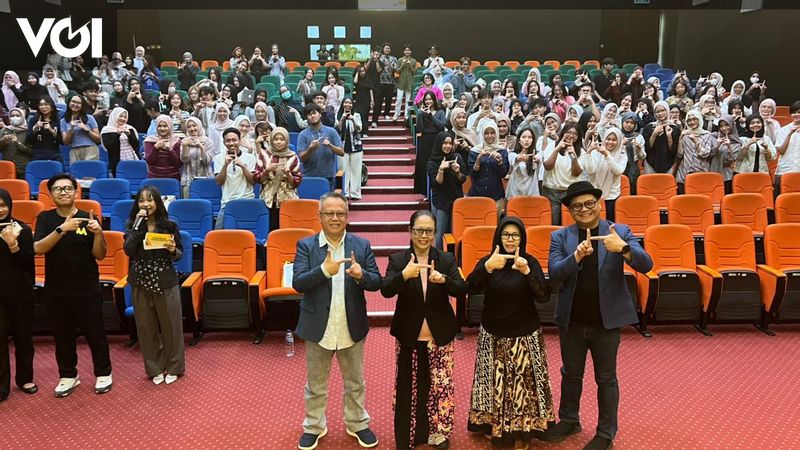Listen to the article
AQUA Urges Gen Z to Develop Critical Media Literacy Amid Digital Noise
Corporate leaders from AQUA, Indonesia’s prominent bottled water producer, called on Generation Z to adopt a more critical approach when consuming information on social media platforms. The appeal came during a public lecture on Digital Crisis Communication held at the University of Indonesia’s Vocational Auditorium on Thursday.
The event drew hundreds of students and faculty members, featuring a panel of communication experts including Arif Mujahidin, Corporate Communications Director of Danone Indonesia (AQUA’s parent company), digital communication specialist Rulli Nasrullah, Indonesian KPU expert Diah Widyawati, and moderator Jojo Suharjo, CEO of Makarovox.
During his presentation, Mujahidin emphasized the crucial need for information literacy in today’s digital landscape. “We choose education and openness as our approach. We explain issues directly to the public through traditional media, digital channels, and academic forums like this one,” he stated, highlighting AQUA’s commitment to transparent communication in an era dominated by digital noise and misinformation.
Mujahidin took the opportunity to address common misconceptions about AQUA’s water sourcing practices. Drawing on hydro isotopic research findings, he clarified that AQUA’s water comes from mountain hydrogeological systems rather than ordinary groundwater reservoirs.
“The DNA of our water is identical to rainwater stored in mountain aquifers,” Mujahidin explained. “The drilling process is merely a means to access water from the mountain system, not an indiscriminate extraction of groundwater resources.” This distinction has significant environmental implications and addresses concerns about sustainability in water bottling operations.
Beyond responsible sourcing, AQUA implements comprehensive conservation initiatives throughout watershed areas. These efforts include reforestation projects, construction of infiltration wells, and regenerative agricultural practices. The company also runs Water Access, Sanitation, and Hygiene (WASH) programs to improve community access to clean water and sanitation facilities in surrounding areas.
The session generated considerable interest among attendees, with numerous students engaging in the Q&A portion on crisis management strategies in the digital age. One participant expressed appreciation for the insights gained: “Mr. Arif’s explanation resolves my misconceptions about AQUA’s water sources and provides valuable perspective on industrial communication practices.”
Moderator Jojo Suharjo noted that the discussion successfully bridged theoretical concepts with practical applications of crisis communication. Meanwhile, Marela Maulidiyanti, Head of Public Relations for UI’s Vocational Commission, underscored the value of such educational forums: “We aim to develop a generation of young communication professionals who approach information critically, adapt readily to changing landscapes, and resist the influence of misinformation.”
The event represents part of a broader trend among major companies to engage directly with younger consumers on issues of digital literacy and critical thinking. As Generation Z becomes increasingly influential in consumer markets and public discourse, corporations like Danone Indonesia recognize the importance of fostering constructive dialogue about information consumption habits.
For AQUA, which has occasionally faced public scrutiny regarding environmental practices, such educational outreach serves dual purposes: addressing potential misconceptions while encouraging more thoughtful engagement with corporate messaging in digital spaces.
The University of Indonesia forum exemplifies how academic institutions and private sector entities can collaborate to enhance media literacy among emerging professionals in an age when distinguishing factual content from misinformation has become an essential skill for responsible citizenship.
Fact Checker
Verify the accuracy of this article using The Disinformation Commission analysis and real-time sources.




10 Comments
AQUA’s focus on equipping Gen Z with critical media literacy skills is a proactive and commendable approach. In an age of digital noise and misinformation, fostering informed and discerning consumers is vital.
The partnership with universities to reach students directly seems like a smart strategy. I’m curious to see how AQUA measures the success and impact of this initiative over time.
It’s good to see a major corporation like AQUA taking proactive steps to address the digital misinformation challenge. Fostering critical thinking and media literacy among Gen Z is an important investment in the future.
I’m curious to learn more about the specific strategies and tactics AQUA is using to engage with Gen Z on this issue. Targeting young people directly through universities is a smart approach.
Engaging Gen Z to combat digital misinformation is a smart move by AQUA. Building critical media literacy skills is crucial in today’s information landscape. I’m curious to learn more about AQUA’s approach and how it’s resonating with the younger generation.
Transparent communication and education are key to countering misinformation. It’s great that AQUA is leveraging academic forums to reach students directly.
As someone who values factual, evidence-based information, I’m encouraged to see AQUA taking on the challenge of digital misinformation. Engaging the next generation of consumers through education and transparency is a step in the right direction.
I’m curious to learn more about the specific tactics and tools AQUA is using to empower Gen Z with critical media literacy skills. Addressing this issue head-on is an important effort.
As someone who follows the mining and commodities space, I’m intrigued by AQUA’s efforts to combat digital misinformation. Developing strong information literacy skills is crucial for the next generation of consumers and decision-makers.
I agree that transparent communication and education are essential. It will be interesting to see how AQUA’s initiative evolves and what kind of impact it has on Gen Z.